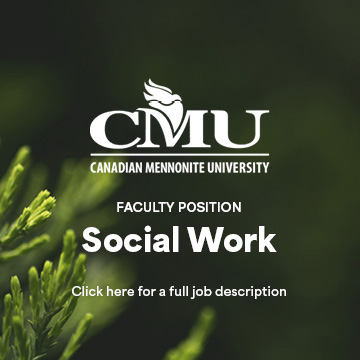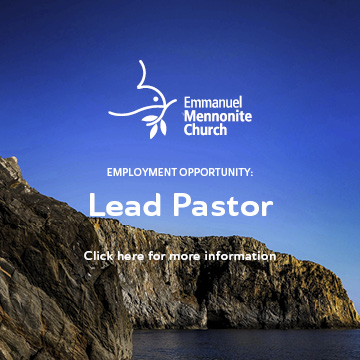It’s fairly common for young Canadian Mennonites to attend one of the Mennonite institutions for their undergraduate studies, but many young Mennonites are heading back to school to pursue the newer graduate programs at the Mennonite institutions.
Melanie Kampen, 23, for example, recently graduated from Canadian Mennonite University’s Bachelor of Theology program and is heading to Conrad Grebel University College to pursue a Master of Theological Studies. The MTS program is a very flexible program at CGUC, Kampen says, which is why she was drawn to it. Kampen, who will major in Christian Ethics, will be able to take classes across disciplines.
“This enables me, for example, to take some classes in the new Masters of Peace and Conflict Studies program for my MTS degree. Because my interests are in Christian Ethics, specifically with questions of the church’s work of peace and justice in the world, this area of the program was important to me,” she said.
Kampen has been advised to become educated at schools with a variety of different denominational backgrounds, but this isn’t as important to her as becoming educated across theological disciplines, she says.
“I’m ultimately not as concerned with gaining a wide variety of denominational ethics on Christian ethics, for example, as I am with figuring out what it means to live well with those around me, who might have different perspectives, from a particularly Anabaptist understanding of God’s people in God’s world,” she said.
Though Kampen is going for her Masters in order to prepare her for Doctoral work, her main reason for pursuing graduate studies is to engage with the world around her.
“My interest is at the margins of academic and church life, trying to bring the two into conversation so that they might build each other up and together work for peace and justice in the world,” she said.
Marco Funk, 32, is not heading back to school, but completed a Master of Arts in Theological Studies program at CMU in 2006 after taking his undergraduate studies there. Funk decided to attend CMU because of the top-notch biblical scholars and theologians that he would be working under, he said. While many graduate students aren’t really sure if they’ll get what they expect from their studies, Funk got more than he hoped for.
“I got exactly what I came for, with the added gift of good friendships in he community of students, and also friendships with my professors,” Funk said. He is currently the pastor at Gretna Bergthaler Mennonite Church.
Kimberly Penner, 25, who also attended CMU for her Bachelor of Biblical and Theological Studies, graduated from CGUC with a Master of Theological Studies and is heading to the Toronto School of Theology in the fall for a Doctor of Theology, also hoping to be a professor of theology one day. Mennonite institutions have greatly informed her worldview, she said.
“My understanding of scripture as the word of God to be interpreted by the Holy Spirit in its historical and cultural context, which I learned from CMU is an important lens through which I view the world and make life choices.”
“For example, environmental ethics, sexual ethics, the life of the church, I view all of these things through the lens of biblical interpretation. Mennonite institutions have taught me how to study scripture and thus have influenced my world view in this way,” Penner said.
Penner hopes to continue to learn more in her field of study and to teach these things to the wider church.
Penner, like Kampen and Funk, believes that Mennonite institutions are important for the unique education they offer and the community they emphasize.
“Mennonite institutions are important because they provide a unique education that includes a community in which you feel the support of other believers, and an academic opportunity to study the Bible or any other subject from a Mennonite perspective,” Penner said.




Add new comment
Canadian Mennonite invites comments and encourages constructive discussion about our content. Actual full names (first and last) are required. Comments are moderated and may be edited. They will not appear online until approved and will be posted during business hours. Some comments may be reproduced in print.